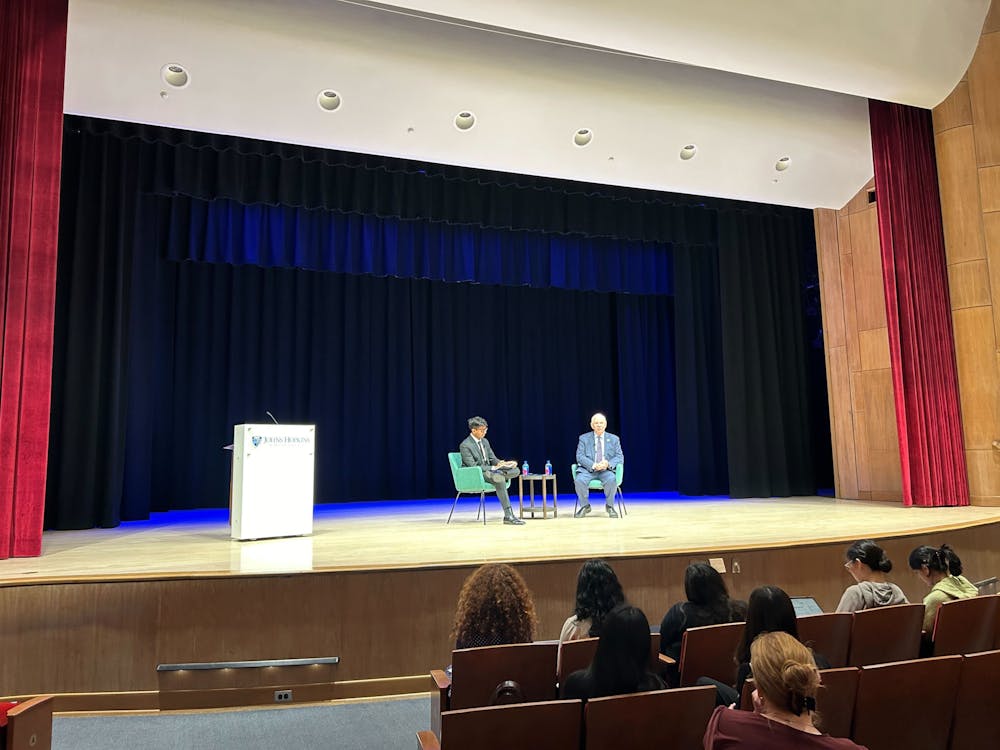The Hopkins Lecture Series collaborated with Hopkins Votes and the Political Science Steering Committee to host Senator Ben Cardin (D-Maryland) for their final event of the semester on Oct. 29 to discuss foreign policy.
Before representing Maryland in the U.S. Senate, Cardin served in the U.S. House of Representatives. Throughout his career, he has focused on issues like foreign policy, health care, retirement security, the environment and the economy. Cardin, serving as chair of the Senate Foreign Relations Committee, has prioritized the place of human rights, good governance and national security in the United States’ approach to foreign policy.
The symposium opened with a speech from Cardin before moving on to a Q&A section. The moral of Cardin’s speech was to embrace the United States’ adoption of a “values-based foreign policy,” or foreign policy for the sake of what you believe in rather than what will benefit you.
“Values-based foreign policy. It’s not transactional,” Cardin explains. “We’re not doing this for that country to do something for us. We’re doing it because we want that country to be prosperous, because we believe in human rights because that’s in our DNA.”
Cardin goes on to knowingly make an understatement by referring to our current era as tough living. Cardin continued by prescribing how to move forward: Don’t lose hope.
In a world where it’s impossible to predict what will or won’t benefit you, it’s necessary to listen to your own moral compass, which Cardin said will provide you with hope. Cardin cited that this has historically proven itself to be the right medicine, from treating the Soviet divide of Germany to helping journalist Vladimir Kara-Murza survive imprisonment in modern-day Russia.
Cardin rested his case by calling out to the audience directly, providing them with a blueprint on how to move forward in this world.
“I hope some of you will consider a career in public service,” Cardin began. “I hope you all stay engaged in foreign policy and international relations. I hope you study history. I hope you study civic engagement. I hope you practice civility. Because I think that’s the formula [to] live in a better world.”
The discussion transitioned to the Q&A session, with the Hopkins Lecture Series’ Co-Executive Director, junior Akshat Sinha, asking Cardin questions selected from Hopkins students’ submissions. One of the topics was the U.S. government’s support — sufficient or not, questioned Cardin — regarding human rights and humanitarian organizations.
Cardin explained the money behind the entire operation. The U.S. government’s foreign assistance budget is around $40 billion, with a fraction of that truly being directed toward combating human rights violations or supporting good, anti-corruption democratic governments. Cardin concluded that we don’t spend enough to promote adequate governance or human rights; instead, we funnel that money into migration and the military.
Freshman attendee Vinay Kalva found this section of the symposium to be the most riveting.
“I really did not realize that the United States funds so much,” Kolva admitted in an interview with The News-Letter. “I definitely want to learn more about what the U.S. does, so if we could potentially improve those areas.”
When the Q&A featured a question on politicians’ ages — if there should be term limits or if the discussion is ageist — Cardin took the opportunity to lighten the mood of an otherwise intensely serious night.
“Well, that’s a good question to ask me,” 81-year-old Cardin quipped, having mentioned earlier in the night his decision to retire. Cardin then stated that, while he does believe in a diversity of ages in the Senate — especially younger ones — he finds the idea of term limits restrictive.
This idea caught the attention of junior Seth Choi, who summarized Cardin’s stance when asked in an interview with The News-Letter what topic he found to be most comprehensively covered.
“I found his comments on term limits very insightful,” Choi said. “He said that it would probably be harmful for the U.S. Senate to have term limits because the legislature is already weak, and that would weaken it further.”
After the event, Cardin stuck around to meet attendees who wished to speak with him. He answered several questions from students, even as his personnel stood by waiting to escort him to his vehicle.
Sinha, when asked in an interview with The News-Letter what differentiated Cardin from other guests featured by the Hopkins Lecture Series, gave an answer that many college clubs can’t boast.
“I believe that this event was the first time (in recent history) that we hosted a sitting elected official,” Sinha provided. “[T]his detail made [the] discussion more nuanced and insightful, especially in regard to American Foreign Policy.”





